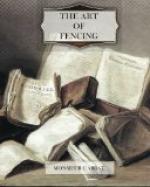For my Part, though I had my Instructions from the late Mr. Hillary Tully of London, who was (and I think with great Reason) esteemed a most eminent Master in his Time, I thought I could not make too nice a Scrutiny into my Profession, by comparing Notes with Monsieur L’Abbat, which improved me in some Points, and confirmed me and others, to my no small Satisfaction, being well persuaded, that, as a Professor of this Science, it would have been an unpardonable Fault in me to deprive our Nations of such an Improvement, either through Prejudice to his, or Partiality to my own Opinion.
Though I have already said that Mr. L’Abbat’s Rules are nice, reasonable, and demonstrative, yet I would not have it inferred from thence, that he approves of them all, as really essential to the Art of Fencing; there being some which he does not approve of, and which he would not have mentioned, had they not interfered with his profession, by the Practice and Recommendation of some Masters, who being more capricious than knowing, were fonder of the shewy or superficial, than of the solid Part of the Science.
Volting, Passing, and Lowering the Body, are three things which Mr. L’Abbat disapproves of, in which Opinion I join; because the Sword being the Instrument of Defence, there can be no Safety when the proper Opposition of the Blade is wanting, as it is in volting and lowering the Body, and in passing, by reason of the Weakness of the Situation, which cannot produce a vigorous Action.
Notwithstanding which, there is a modern Master, who as soon as he had seen this Book, and the Attitudes representing volting, passing and lowering the Body, began and still continues teaching them to his Scholars, without considering how unsafe and dangerous they are, for want of the proper Opposition of the Sword when within Measure.
Of all Professions, that of Arms has in all Ages, since their Invention, been esteemed the noblest and most necessary; it being by them that the Laws preserve their Force, that our Dominions are defended from the Encroachments of our Enemies, and ill designing People kept in the Subjection due to their Sovereigns; and of all Arms, the Sword is probably the most ancient: It is honourable and useful, and upon Occasion, causes a greater Acquisition of Glory than any other: It is likewise worn by Kings and Princes, as an Ornament to Majesty and Grandeur, and a Mark of their Courage, and distinguishes the Nobility from the lower Rank of Men.
It is the most useful, having the Advantage of Fire Arms, in that it is as well defensive as offensive, whereas they carry no Defence with them; and it is far preferable to Pikes and other long Weapons, not only because it is more weildy and easy of Carriage, but also by reason of the Perfection to which Art has brought the Use of the Small Sword; there being no Exercise that conduces so much as Fencing, to strengthen and supple the Parts, and to give the Body an easy and graceful Appearance.




